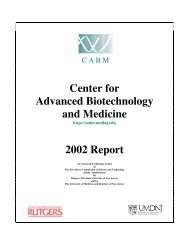Annual Report 2011 - Center for Advanced Biotechnology and ...
Annual Report 2011 - Center for Advanced Biotechnology and ...
Annual Report 2011 - Center for Advanced Biotechnology and ...
You also want an ePaper? Increase the reach of your titles
YUMPU automatically turns print PDFs into web optimized ePapers that Google loves.
Dr. Céline Gélinas<br />
CABM Resident Faculty Member<br />
Professor<br />
Department of Biochemistry<br />
Associate Dean <strong>for</strong> Research<br />
UMDNJ-Robert Wood Johnson<br />
Medical School<br />
Dr. Sheng Ge<br />
Research Associate<br />
Dr. Poonam Molli<br />
Research Associate<br />
Dr. Sophie Richard-<br />
Bail<br />
Research Associate<br />
Dr. Anitha Suram<br />
Research Associate<br />
Na Yang<br />
Graduate Student<br />
Tumor Virology Laboratory<br />
Dr. Céline Gélinas came to CABM in September 1988 from the University of<br />
Wisconsin, where she conducted postdoctoral studies with Nobel laureate Dr.<br />
Howard M. Temin. She earned her Ph.D. at the Université de Sherbrooke in<br />
her native country, Canada, <strong>and</strong> received a number of honors including the<br />
Jean-Marie Beauregard Award <strong>for</strong> Academic <strong>and</strong> Research Excellence, the<br />
National Cancer Institute of Canada King George V Silver Jubilee<br />
Postdoctoral Fellowship, a Medical Research Council of Canada Postdoctoral<br />
Fellowship <strong>and</strong> a Basil O’Connor Starter Scholar Research Award. Her<br />
research is funded by the NIH, the Leukemia <strong>and</strong> Lymphoma Society <strong>and</strong> the<br />
Department of Defense Breast Cancer Research Program. Dr. Gélinas served<br />
<strong>for</strong> several years as a member of the NIH Experimental Virology Study Section<br />
<strong>and</strong> the Virology B Study Section. In 2006, she was elected to the UMDNJ<br />
Stuart D. Cook Master Educators Guild. Dr. Gelinas was appointed Associate<br />
Dean <strong>for</strong> Research <strong>for</strong> RWJMS in 2008. She was elected to Fellowship in the<br />
American Academy of Microbiology in 2010.<br />
Our laboratory focuses on the Rel/NF-kB signaling pathway <strong>and</strong> its role in cell<br />
survival <strong>and</strong> cancer. The Rel/NF-kB transcription factors are key to normal immune<br />
<strong>and</strong> inflammatory responses <strong>and</strong> play critical roles in tumor cell survival,<br />
pathogenesis <strong>and</strong> chemoresistance. They are thus important targets <strong>for</strong> therapy.<br />
Rel/NF-kB is constitutively activated in many human cancers, <strong>and</strong> the Rel proteins<br />
are implicated in leukemia/lymphomagenesis <strong>and</strong> in breast cancer. However, the<br />
detailed mechanism is not fully understood. Our studies aim at underst<strong>and</strong>ing how<br />
changes in NF-kB’s transcriptional activity <strong>and</strong> regulation contribute to<br />
carcinogenesis <strong>and</strong> tumor cell resistance to anti-cancer treatment.<br />
We published a study demonstrating that defective ubiquitin-proteasome mediated<br />
turnover of the NF-kB-regulated apoptosis inhibitor Bfl-1 (Bcl2A1, A1) can<br />
predispose to lymphoma (Fan et al. 2010). Ubiquitination-resistant mutants of Bfl-1<br />
showed decreased turnover <strong>and</strong> greatly accelerated tumor <strong>for</strong>mation in a mouse<br />
model of leukemia/lymphoma. We also showed that these tumors also displayed<br />
upregulation <strong>and</strong> activation of tyrosine kinase Lck along with activation of the IKK,<br />
Akt <strong>and</strong> Erk signaling pathways, which are key mediators in cancer. Coexpression of<br />
Bfl-1 <strong>and</strong> constitutively active Lck promoted tumor <strong>for</strong>mation, whereas Lck<br />
knockdown in tumor-derived cells suppressed leukemia/lymphomagenesis. Since<br />
Bfl-1 is overexpressed in many therapy-resistant leukemia <strong>and</strong> lymphomas <strong>and</strong> is<br />
necessary <strong>for</strong> tumor cell maintenance <strong>and</strong> chemoresistance, these data suggest that<br />
ubiquitination is an important tumor suppression mechanism to regulate Bfl-1<br />
function. This also raises the possibility that mutations in bfl-1 or in the signaling<br />
pathways that control its ubiquitination may predispose to cancer. This work was<br />
conducted together with our colleagues, Drs. Eileen White (CINJ <strong>and</strong> Rutgers<br />
Univ.), Yacov Ron (RWJMS) <strong>and</strong> David Weissmann (RWJMS, RWJUH).<br />
11



